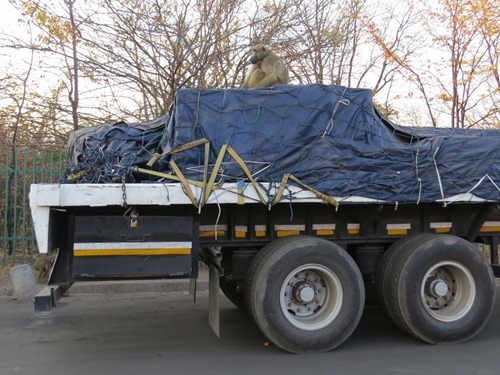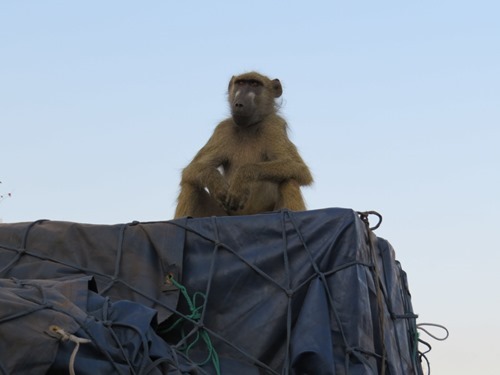The Dream of Aidantopia
I visited Zimbabwe for a day trip to see the other side of Victoria Falls. The view from the Zimbabwe side is more impressive than the one from Zambia, but due to the political problems, not as many people visit Zimbabwe any more.
When Robert Mugabe took power in Zimbabwe, he was noted for his conciliatory gestures towards white farmers, but that changed and the country has suffered for years. The economy became so bad that it suffered from hyperinflation.
…prices doubled at least every day. In July, the central bank issued a banknote with a value of 100 billion dollars, but it could buy no more than half a loaf of bread. Six months later, the bank issued a new banknote of 100 trillion dollars. But the rout continued until the government abandoned the Zimbabwe dollar altogether in favour of using foreign currency.
Now they use US dollars. There are locals who try and sell old billion dollar notes to tourists for a few dollars. Mugabe has managed to cling on to power. He’s 91 and it appears as though his memory is failing. (He read the same speech twice in Parliament http://www.abc.net.au/news/2015-09-16/zimbabwe-president-mugabe-delivers-wrong-speech-in-parliament/6779412). He is very fond of Australia and responds favorably to any criticism of his regime, announcing that – “Australia has criminal blood. There are criminals who were shipped to that place and settled there.”
Mugabe used to be known for his love of learning. When writing about Mugabe, Paul Theroux remarked “There was no deadlier combination than bookworm and megalomaniac. It was, for example, the crazed condition of many novelists and travellers.”
Mugabe was also recently awarded a Chinese peace prize.
The chairman of an award dubbed China’s Nobel peace prize has defended the decision to honour Robert Mugabe, the Zimbabwean president, for supposedly “injecting fresh energy” into the global quest for harmony.
http://www.theguardian.com/world/2015/oct/22/zimbabwes-robert-mugabe-awarded-chinas-nobel-peace-prize
Zimbabwe has been in the news recently due to the death of Cecil the lion (animal deaths often cause more international outcry than political deaths). http://www.bbc.com/news/world-africa-33722688
Cecil was named after diamond magnate, Cecil Rhodes. Zimbabwe was formerly called Rhodesia. Rhodes modestly remarked, “To have a bit of country named after one is one of the things a man might be proud of.” I’m still hoping that one of the countries I’ve visited will change its name to Aidantopia.
Going on an overland truck, we were fortunate to be able to cross most borders relatively quickly (usually it would take around an hour), but freight trucks can get held up at some African borders for more than a week, causing a long line of trucks. Even the monkeys need to wait to get permission to cross the border between Zambia and Zimbabwe.
We then travelled on to Malawi, where we spent a few days on the shore of Lake Malawi. Malawi used to be called Nyasaland and like many African countries, had a long-reigning dictator after the country gained independence. Hastings Banda wasn’t as bloodthirsty as some other tyrants, but liked to maintain control.
No other African leader imposed his personality with such vigour and force on the country he ruled. He insisted on directing the smallest details of Malawi’s affairs. “Everything is my business. Everything. The state of education, the state of our economy, the state of our agriculture, the state of our transport, everything is my business…Anything I say is law. Literally law. It is a fact in this country.”…
He tolerated neither dissent nor criticism. No one was permitted to question his authority or his decisions. His quest for absolute control extended to interference with the courts. The strict puritan code which he so much admired became the nation’s way of life. Men were forbidden to wear long hair; women were forbidden to wear short skirts or trousers. Films, foreign newspapers, magazines and books were strictly censored to prevent decadent Western influences from harming the population.
We had some long drives on the trip and I read a few books on African history. Martin Meredith’s books The Fortunes of Africa: A 5000-Year History of Wealth, Greed, and Endeavor and The Fate of Africa: A History of the Continent Since Independence outline some of the political misfortunes suffered by Africa. Uganda’s Idi Amin is the gold standard when it comes to African dictators.
Dictatorial allcomers must bow before Ugandan president Idi Amin, who styled himself His Excellency, President for Life, Field Marshal Al Hadji Doctor Idi Amin Dada, VC, DSO, MC, Lord of All the Beasts of the Earth and Fishes of the Seas, and Conqueror of the British Empire in Africa in General and Uganda in Particular. The MC and DSO were fictitious; the VC was a Victorious Cross he awarded to himself; and the law degree, too, was self-conferred. Amin also claimed to be the uncrowned King of Scotland, which later became the title of a novel by Giles Foden and of an Oscar-winning film.
Then there was the Central African Republic’s Jean-Bedel Bokassa
He liked to describe himself as an absolute monarch and forbade mention of the words democracy or elections. He promoted himself first to the rank of general and then to marshal, for supreme services to the state. For public appearances he insisted on wearing so many medals and awards that special uniforms had to be designed for him to accommodate them. He delighted in naming after himself a host of schools, hospitals, clinics, roads and development projects as well as Bangui’s new university. The front page of every school exercise book in the entire country was adorned with his picture…
Most of his wives tended to be known by their nationality; they included the German, the Swede, the Cameroonian, the Chinese, the Gabonese, the Tunisienne, and the Ivorienne…
In an attempt to emulate Napoleon, whom he described as his guide and inspiration, Bokassa declared the Central African Republic an empire and himself emperor of its 2 million subjects and made elaborate arrangements for his own coronation, using as a model the ceremony in which Napoleon had crowned himself emperor of France in 1804. From France he ordered all the trappings of a monarchy: a crown of diamonds; an imperial throne, shaped like a golden eagle; an antique coach; thoroughbred horses; coronation robes; brass helmets and breastplates for the Imperial Guard; tons of food, wine, fireworks and flowers for he festivities and sixty Mercedes-Benz cars for the guests.
The coronation took place on 4 December 1977 at the Palais des Sports Jean-Bedel Bokassa, on Bokassa Avenue, next to the Universite Jean-Bedel Bokassa. To the strains of Mozart and Beethoven, wearing a twenty-foot-long red-velvet cloak trimmed with ermine, Bokassa crowned himself and then received as a symbol of office a six-foot diamond-encrusted sceptre.
The spectacle of Bokassa’s lavish coronation, costing $22 million, in a country with few government services, huge infant mortality, widespread illiteracy, only 260 miles of paved roads and in serious economic difficulty, aroused universal criticism. But the French, who picked up most of the bill, curtly dismissed all such criticism. The French Cooperation Minister, Robert Galley said, “I find it extraordinary to criticise what is to take place in Bangui while finding the Queen of England’s Jubilee ceremony all right. It smacks of racism.”
Less than 2 years later, the French removed Bokassa after he ordered the murder of more than 100 school children.
Equatorial Guinea’s Francisco Macias Nguema executed 10 of the 12 ministers from his first government and replaced them with family members.
The central bank too was closed after the director was publicly executed in 1976. All foreign exchange was delivered instead to Nguema who hoarded it along with large amounts of local currency in his various palaces… When Nguema was short of money, he resorted to ransoming foreigners… In long, rambling and incoherent speeches, Nguema fulminated against his pet bugbears – education, intellectuals and foreign culture. He closed all libraries in the country, prohibited newspapers and printing presses and even banned the use of the word “intellectual.” All formal education came to an end in 1974 when Catholic mission schools were told to close. Children from then on were taught only political slogans…Out of a population of 300,000, at least 50,000 had been killed and 125,000 had fled into exile…
He sometimes carried out lengthy monologues with former colleagues whom he had executed. His movements were often jerky and uncoordinated; he became progressively deaf, shouting loudly in order to hear himself, refusing the use of hearing aids; he consumed large quantities of drugs, local stimulants like bhang and iboga, that visibly affected the pupils of the eyes…He took with him most of the national treasury, storing huge wads of bills in bags and suitcases in a bamboo hut next to his house.
The Daily Show had a recent clip pointing out the things Donald Trump has in common with African dictators. (The video isn’t available in Australia though).


Wow! Aidan! This is fascinating! And very sad, too.
The Congo had it even worse. King Leopold’s Ghost is an amazing book about some of the things that went on there.
…and after the Belgians left, Congo got Mobutu Sese Seko aka “the cock that leaves no hen unruffled”, another African dictator who deserves to be added to your list: http://www.theguardian.com/cities/gallery/2015/feb/10/inside-gbadolite-mobutu-ruined-jungle-city-in-pictures
I’d read about Mobutu but I didn’t know the ruins of his palace were still around.
You failed to include Bruce…
That was a good retrospective on the swings and roundabouts of African politics. By the way, before Mugabe in Zimbabwe there was Canaan Banana, who outlawed the making of jokes about his name. (https://en.wikipedia.org/wiki/Canaan_Banana)
The Trump video was hilarious.
Bruce is almighty.
Life would be difficult for someone named Banana.